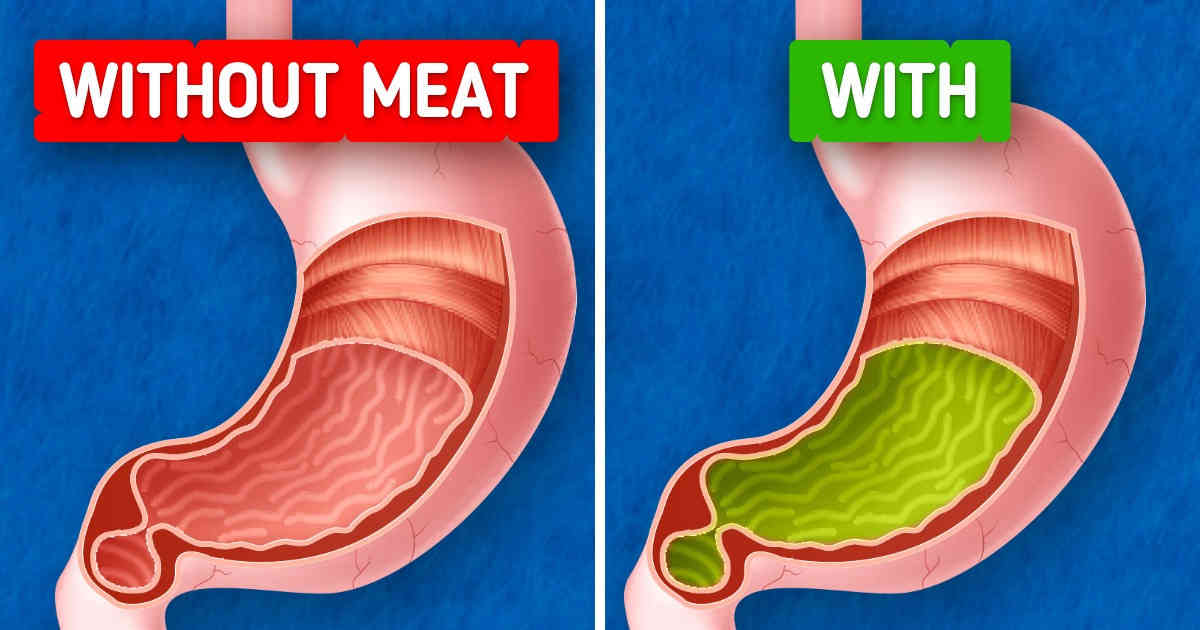Eliminating meat from your diet can have a significant impact on your overall health, metabolism, and even mental well-being. As more Nigerians embrace plant-based or vegetarian lifestyles, it’s crucial to understand the physiological and nutritional changes that occur when meat is completely removed from daily consumption.
In this report, we explore the evidence-based health effects of a meatless diet, including both potential benefits and risks, and how the body responds in the short and long term.
TJ News Nigeria reports that while a vegetarian or vegan diet can lead to impressive health benefits, it also requires careful planning to avoid nutritional deficiencies.
What Happens Immediately After You Stop Eating Meat?
1. Your Gut Bacteria Begins to Shift
Within days of removing meat, your gut microbiome—a collection of bacteria in your digestive tract—starts to change. Studies show that meat-heavy diets increase bacteria associated with inflammation, while plant-based diets promote gut bacteria linked to better digestion and lower disease risk.
- Fiber from fruits, vegetables, legumes, and grains feeds beneficial bacteria.
- Reduced meat intake can lower gut-derived toxins like TMAO, which is linked to heart disease.
2. You May Feel Less Bloated
Meat, especially red meat, can be hard to digest. When you stop eating meat and increase fiber intake from plant foods, your digestive system may become more regular, easing bloating and constipation.
Pay Attention To: How Sickle Cell Carriers Can Live Long and Healthy Lives — Naturally and Backed by Science
Health Benefits of Quitting Meat
3. Lower Risk of Chronic Diseases
Clinical research has consistently found that plant-based diets are associated with a reduced risk of:
- Heart disease: Lower intake of saturated fat and cholesterol improves blood pressure and cholesterol levels.
- Type 2 diabetes: Plant-based diets improve insulin sensitivity and glycemic control.
- Certain cancers: According to the World Health Organization (WHO), processed meats are classified as carcinogens. Eliminating them can reduce cancer risk.
4. Improved Weight Management
When done correctly, cutting out meat may support weight loss. Many plant-based foods are lower in calories and higher in fiber, which promotes satiety.
- A 2021 review in the Journal of Nutrition showed that vegetarians typically have lower body mass indices (BMIs).
- Reducing calorie-dense meats in favor of whole plant foods can help prevent obesity.
What Nutrients Do You Miss by Not Eating Meat?
While there are health benefits, meat is a primary source of essential nutrients like:
- Iron (especially heme iron)
- Vitamin B12
- Zinc
- Omega-3 fatty acids (EPA & DHA)
- Protein (complete amino acid profiles)
5. Risk of Nutritional Deficiencies
When you stop eating meat, you must compensate for the following:
Iron Deficiency
Iron from plant sources (non-heme iron) is less absorbable than meat-based (heme) iron. This can lead to fatigue or anemia.
Solution: Eat iron-rich foods like spinach, lentils, and fortified cereals, and pair them with vitamin C for better absorption.
Vitamin B12 Deficiency
B12 is crucial for nerve function and is found naturally only in animal products.
Solution: Take fortified foods or B12 supplements.
Protein Gaps
While plants do offer protein, not all provide complete amino acids.
Solution: Combine foods like rice and beans, or use plant-based protein powders.
Mental and Hormonal Changes
6. Mood and Cognitive Effects
Meat contains compounds like creatine, carnosine, and taurine that play roles in brain function. Some people may feel mood dips after cutting meat, especially if not getting enough omega-3s and B12.
However, a well-balanced vegetarian diet rich in whole grains, nuts, and seeds can support optimal brain health.
7. Changes in Hormone Levels
Reducing saturated fat may help balance hormones, especially in women with conditions like PCOS. Some studies also indicate reduced estrogen dominance and improved hormonal regulation on vegetarian diets.
How Your Energy and Skin May Improve
8. Increased Energy Levels
While some report fatigue initially due to reduced B12 or iron, a balanced meat-free diet can lead to:
- Improved digestion
- Lower inflammation
- Stabilized blood sugar levels
These factors contribute to better and more sustained energy throughout the day.
9. Healthier Skin
Plant-based diets rich in antioxidants (vitamins C and E, beta carotene, etc.) can improve skin appearance. Cutting processed meats also reduces inflammatory compounds that worsen acne and eczema.
Impact on the Environment and Ethical Considerations
10. Environmental Sustainability
A significant benefit of stopping meat consumption lies in the environmental impact:
- Lower carbon footprint
- Reduced water usage
- Preservation of ecosystems
Many people choose to stop eating meat not just for health, but also to support climate action.
11. Ethical Awareness
The choice to quit meat often aligns with moral and ethical views regarding animal welfare, industrial farming practices, and cruelty-free living.
Tips for Transitioning to a Meat-Free Diet
Making a healthy transition requires planning. Here are proven steps:
- Start with meatless days: Introduce 1-2 plant-based days per week.
- Explore plant protein sources: Lentils, tofu, tempeh, chickpeas, and quinoa.
- Use fortified foods: Choose cereals, plant milks, and nutritional yeast with B12 and iron.
- Consult a dietitian: For personalized advice and supplementation guidance.
- Monitor health changes: Especially for iron, B12, and overall energy.
Conclusion: Should You Stop Eating Meat?
Going meat-free can improve heart health, aid weight loss, and reduce disease risk—but it’s not without potential drawbacks if poorly managed. The key lies in replacing meat with diverse, nutrient-rich plant foods and monitoring essential vitamins and minerals.
TJ News Nigeria reports that a balanced vegetarian or vegan diet is safe and beneficial for most people if appropriately planned, supplemented, and adjusted to individual health needs.
